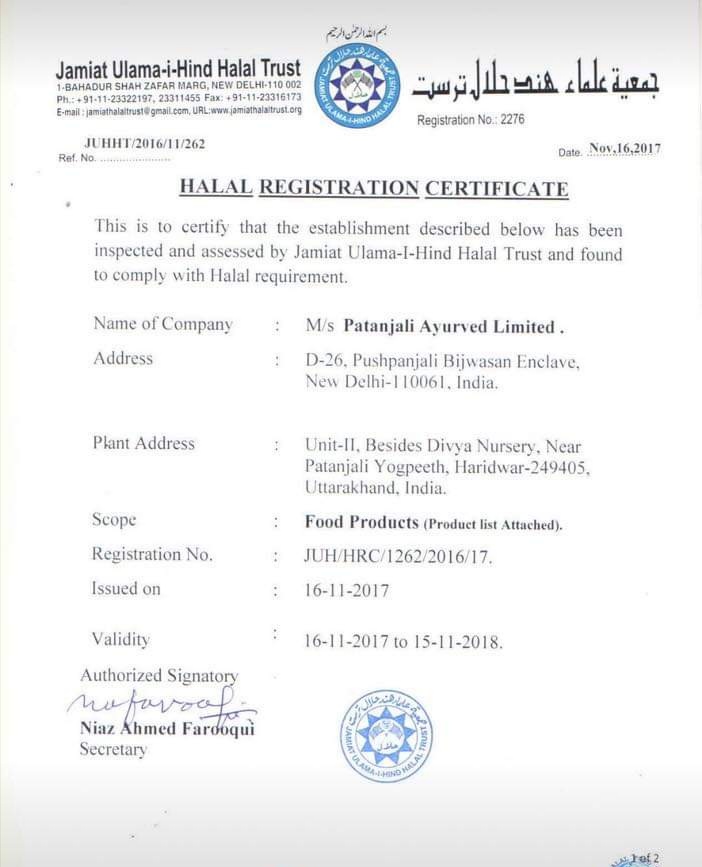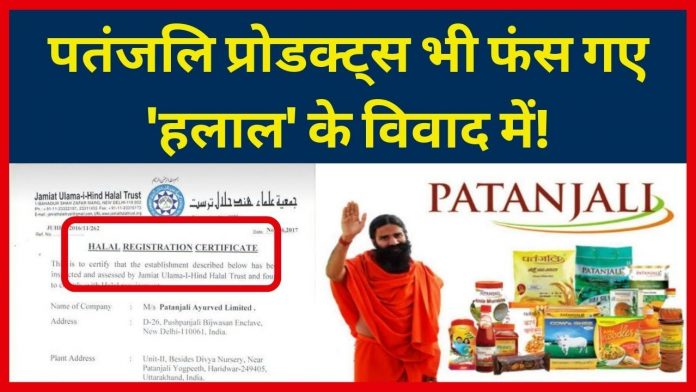By Aas Mohammad Kaif, TwoCircles.net
The granting of Halal certificate by Jamiat Ulema-e-Hind to Patanajli Group has raised eyeballs from the Muslim community in India, with many criticizing the move, Aas Mohammad Kaif of TwoCircles.net reports.
As the Jamiat Ulema-e-Hind, on behalf of its Halal Trust issued ‘Halal Certificate’ to Baba Ramdev’s Patanjali products, General Secretary of the Jamiat, Maulana Mahmood Madani, has come under heavy criticism for the same.
Madani is alleged to have ‘cordial relations with Baba Ramdev’.
The criticism, however, has surfaced after 6 months of Patanjali receiving the certification.
“The certificate was issued six months ago and it is not appropriate to create a ruckus today. We simply followed the rules,” said General Secretary of Halal Trust, Niyaz Ahmed Farooqi on Tuesday.
Farooqi also confirmed the news of certification in an official statement on Tuesday.
After rounds of deliberation and discussion, the Ulema council of Muslims has questioned the Jamiat’s intentions of issuing the certificate.

Madani, speaking about granting Halal certification of Patanjali, said it has been issued a halal tag for 3 years, like any general company.
Besides common people on social media, groups like All India Halal Trust’s has also criticized the Jamiat for issuing the certificate.
Talking to TwoCircles.net, an official All India Halal Trust Danish Riyaz said that “they would take the issue to Malaysia World Halal Conference this year.”
The granting of the certificate to Patanjali is being debated and questioned in many quarters among Muslims.
It is to be noted that the company, Patanjali Ltd, had been applying for halal certification for its Ayurvedic foods range for a long time from the Halal India Trust but had not cleared its way through. Halal India issues certificates according to Shariah compliance of companies on dietary ingredients and it is the main institution that grants Halal certification.
Jamiat Ulema-e-Hind Halal Trust, on the other hand, is popular in Malaysia and Indonesia, and maintains influence in the Middle East, thus enhancing Patanjali’s trading profits with the certification in these countries.
However, Jamiat Ulema-e-Hind Halal Trust is not the prime institution to issue a halal certificate to companies.
Halal India holds a global prominence and most companies obtain their certification from Halal India, including KFC, McDonald and Haldiram India.
Baba Ramdev’s Patanjali company had earlier applied for the certificate Halal India but was denied the same.

An official of Halal India, Sarfaraz Alam, explained that the application for the issuance of the halal certificate first goes through a team of Islamic scholars and knowledgeable people who analyze the ingredients.
After being thoroughly satisfied with the investigation, Halal India, in accordance with Shariah standards, ensures that the particular product is halal. Halal, as mentioned in the Qur’an means ‘permissible’, which is a distinction used in dietary practices worldwide by Muslims. After all inquiries of the product is found edible, it is deemed as Halal.
However, Ramdev’s Patanjali openly claims it uses cow urine in its products, which is non-permissible for Muslims, hence, deeming it non-Halal for consumption. The Halal certificate issued on Haldiram vegetarian foods has a Halal trademark, flour and other grains have Halal certification, and several daily use products in the market including preservatives have halal certification.
The issuance of Halal certificate to Patanjali by Jamiat Halat Trust despite denied by Halal Halal India has to lead to outrage.
People blame the cordial relations between Jamiat’s Madani and Baba Ramdev for the granting of Halal certificate to Pantanjali.
Maulana Madani, as a result, is facing public criticism.
Maulana Niyaz Ahmed Farooqi, talking about the issue said that across the country, many land properties are also issued halal certificates but
Jamiat Ulema-e-Hind Halal Trust, in its defence, maintains that Patanjali products have met all the requirements and processes, investigated by a team of knowledgeable people.
Jamiat further clarified that some food commodities by Patanjali like edible ones, do not have cow urine on it; they have basic ingredients like flour, flour, oil.
Spokespersons from the Jamiat have said that ‘some people have only objected to the issuance of Halal certificate given to a Hindu company.’
Jamiat issued a statement saying that ‘while issuing Halal certification, Jamiat does not differentiate between race and religion.”
In November 2017 too, Jamiat had issued the halal certificate to Patanjali, allowing Patanjali to sell its products in Qatar.
The validity of certification was for only for a year, which now has been extended to three years.
Back in 2017, the issuance of Halal certificate by Jamiat was fiercely criticized by Muslims.
While Ramdev openly proclaims they use cow urine in all the products, the company, now standing at a value of 25000 crore rupees, needs the Halal certification to increase its sales to the Muslims in the Middle East.

